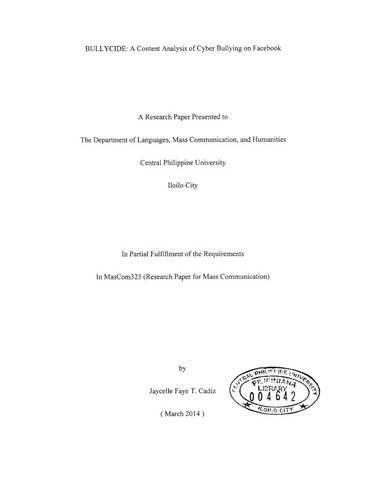Bullycide: A content analysis of cyber bullying on Facebook
| dc.contributor.adviser | Yap-Zerrudo, Anna May | |
| dc.contributor.author | Cadiz, Jaycelle Faye T. | |
| dc.date.accessioned | 2023-03-30T01:54:07Z | |
| dc.date.available | 2023-03-30T01:54:07Z | |
| dc.date.issued | 2014-03 | |
| dc.identifier.citation | Cadiz, J. F. T. (2014). Bullycide: A content analysis of cyber bullying on Facebook (Unpublished special paper). Central Philippine University, Jaro, Iloilo City. | en_US |
| dc.identifier.uri | https://hdl.handle.net/20.500.12852/2591 | |
| dc.description | Abstract only | en_US |
| dc.description.abstract | This is a descriptive research study designed to determine whether or not the Facebook site, Centralian Feeler, is a cyber bully or just a typical member of the student body exercising his/her right of Free Speech. Specifically, the study answered the following objectives a) to analyze, b) examine, c) document the analysis and d) evaluate the results of analysis vis-a-vis the real situation of the contents (posts) of the Facebook site, Centralian Feeler within the timeline of June 2013. Content Analysis was used to understand the meaning of the Facebook posts. The researcher applied a two-way approach. The approach includes, first, analyzing the state of mind of the cyber bully as regard to any psychological or emotional implications based on how statements are worded through posts on Facebook (a social network), and second, determine the reactions and effect to both the recipients and the public readers in general. With the use of Content Analysis, the personality or behavior of the prospective cyber bully may be determined by simply deciphering the mode on which he constructs his statements as well as the language he uses. After a thorough analysis, it revealed that the statements posted in the Centralian Feeler are too vague or couched in general terms as to specifically point out the victim of his/her insults. Mere “Blind Items” providing general descriptions such as membership in a group, sexual conduct, generalized events or occurrences requiring patterned collect: behavior are otherwise not sufficient to specifically determine the identity of the subject of the criticism. It can therefore be said that although the statements are directed towards certain individuals, it can hardly be said to have isolated the victim as for him/her to be clearly identified and be subjected to actual and real public ridicule. Therefore, based on the analysis of the study and in consolidation of all the facts and evidence of the research, the Centralian Feeler is NOT a Cyber Bully as defined and explained in this study, but a typical member of the student body exercising his/her right of Free Speech. | en_US |
| dc.format.extent | v, 52 leaves | en_US |
| dc.language.iso | en | en_US |
| dc.subject.lcc | Filipiniana Theses P 91.5 .P6 .C33 2014 | en_US |
| dc.subject.lcsh | Cyberbullying | en_US |
| dc.subject.lcsh | Content analysis (Communication) | en_US |
| dc.subject.lcsh | Facebook (Electronic resource) | en_US |
| dc.title | Bullycide: A content analysis of cyber bullying on Facebook | en_US |
| dc.type | Special paper | en_US |
| dcterms.accessRights | Not publicly accessible | en_US |
| dc.description.bibliographicalreferences | Includes bibliographical references | en_US |
| dc.contributor.chair | Gotico, Sharlene | |
| dc.contributor.committeemember | Gotico, Sharlene | |
| dc.contributor.department | Department of Languages, Mass Communication and Humanities | en_US |
| dc.description.degree | Bachelor of Arts major in Mass Communication | en_US |


